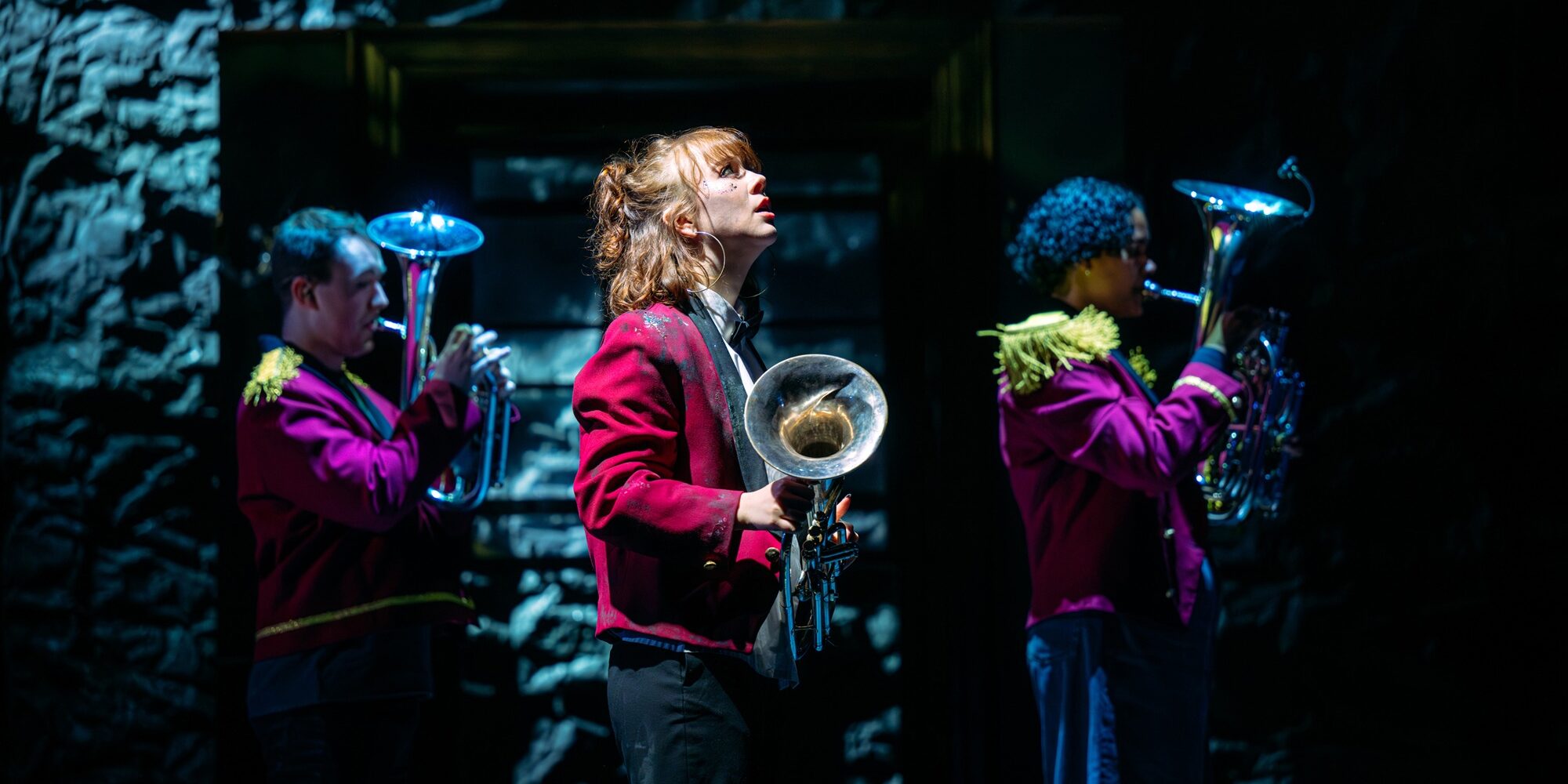Keli is seventeen. Keli lives in a struggling former mining town near Glasgow. Keli works a dead-end supermarket job. Keli dedicates herself to looking after her fragile mother. Keli is the great hope of her brass band. And Keli is struggling. Overwhelmed by pressure, we meet Keli when she has finally buckled under the weight of everything, figuratively and literally disappearing into a hole in the ground.
Keli manages to fit an enormous amount into its two-hour run time. Through the story of a brass band in an ex-coal mining town, it tackles everything from the devastation caused by the loss of industry to the importance of having something to believe in. There are socialist polemics against the evils of capitalism, musings on unequal labour relations and very modern ideas about self-care.
And pressure. Everywhere there is pressure, from the pressure of air being pushed through a horn to make music, to the squeezing of carbon over millennia to form coal and, ultimately, diamonds. The set is constantly hemmed in by walls of coal, symbolising the weight of responsibility and generational trauma that Keli labours under.
After a breathless and absorbing first half, the play loses its way slightly in the second act. An over-long scene set in a London club feels like an unnecessary digression. Having been strong throughout – witty, vibrant and plausible – the script falters right at the end, as writer Martin Green seems to lose confidence in his audience’s ability to read between the lines, and the metaphors become over-laboured. While understandable given the volume of the live music, the mics worn by the actors sometimes make the dialogue sound muddy and unclear.
These are very minor quibbles though. At its best the dialogue is both funny and thought-provoking, and delivered with great verve by the cast. Liberty Black triumphs as the play’s titular hero. Fiery, foul-mouthed and riotously funny, Black infuses Keli with exhilarating levels of passion and energy that never let up.
On stage for virtually the entire performance, she drives the play forward. No matter how many obscene bon mots she comes out with (the audience will never look at a Wagon Wheel biscuit the same way again), Black never lets us forget that Keli is a seventeen-year-old girl who is coping with far too much for one so young.
Black is strongly backed up by the rest of the cast. Karen Fishwick is impressively versatile as she segues smoothly from Keli’s unwell mother to the odious Lady S, while Olivia Hemmati is a riotously entertaining presence. Musicians Hanna Mbuya and Andrew McMillan drench the whole production with the sound of brass instruments, seamlessly ventriloquising music for the actors.
Obviously, in a play about a brass band, the music is crucial. Martin Green’s brass composition occasionally has the air of Vangelis’ Blade Runner score, by turns ominous, soaring and wistful. We lose ourselves in the thumping of club beats and enter the maelstrom of Keli’s head through torrents of sound. The arrival of a full brass band at the play’s conclusion is a moving and uplifting treat.
Like its protagonist, Keli packs an awful lot in. With a story that is both sharply specific and universal-feeling, it is a joyous brass band solo in honour of the importance of belonging, of comradeship, of mutual support and the beauty of making music.
Performed at The Royal Lyceum Theatre, Edinburgh
Runs at The Lyceum until Saturday 17 May, and then at Dundee Rep Theatre, Perth Theatre and Tramway Glasgow
Running time: 2 hours 20 minutes, including interval
Written and composed by Martin Green
Directed by Bryony Shanahan
Set and Costume Designer: Alisa Kalyanova
Sound Designer: George Dennis
Lighting Designer: Robbie Butler
Cast: Louis Abbott, Liberty Black, Karen Fishwick, Olivia Hemmati, Billy Mack, Phil McKee, Hanna Mbuya, Andrew McMillan, Whitburn Band, Kingdom Band

